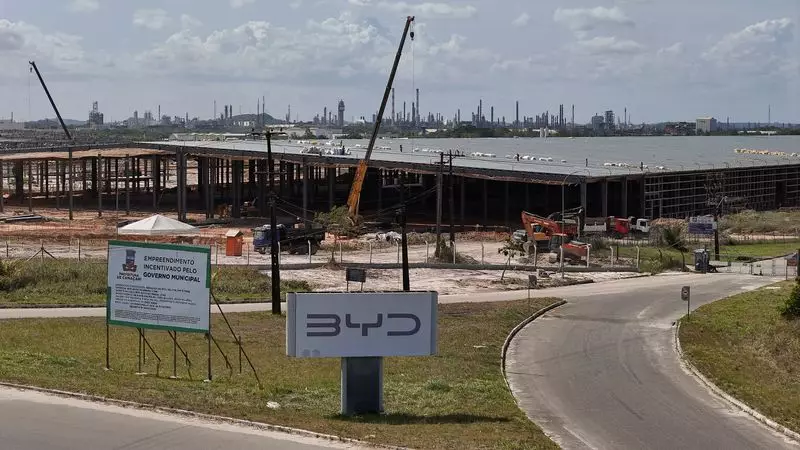In recent weeks, the electric vehicle manufacturer BYD (SZ:002594) has emerged at the center of a labor controversy in Brazil, raising significant concerns regarding the employment practices of foreign companies operating in the country. A total of 163 workers were found in conditions of forced labor, a revelation made by Liane Durao, a labor inspector from Brazil’s Ministry of Labor. Hired through BYD’s contractor, Jinjiang, these workers were brought to Brazil under irregular visa conditions, which has subsequently triggered an investigation into the company’s labor practices.
The implications of these findings extend beyond the immediate risk to the labor rights of the workers involved; they could potentially impact BYD’s reputation and its aspirations for expansion in Brazil, which has become a critical market for foreign investment.
Labor inspections revealed alarming lapses in compliance with Brazilian labor laws. Reports claim that workers employed by Jinjiang were subjected to dire conditions that resemble modern slavery, with key evidence indicating that their passports were withheld, a tactic often employed in human trafficking scenarios. Such practices are particularly concerning as they reflect not only on BYD’s compliance but also on the broader operational ethos of foreign companies in Brazil.
According to Durao, this forensic investigation kicked off in late December, culminating in the prompt rescue of these workers. The need for immediate intervention underscores the severity of the issue; labor authorities are now engaged in negotiations with BYD to ensure compliance and rectify the situation for the remaining workforce. Approximately 500 Chinese workers were reportedly brought into Brazil, emphasizing the scale of operations as well as the resultant ethical challenges.
BYD has invested heavily in its Bahia factory, with around $620 million earmarked for its establishment, underscoring the company’s ambition to manufacture 150,000 vehicles annually. This facility represents a significant foothold for BYD outside of its core Chinese market, where it commands a substantial share of the electric vehicle sector.
However, the unfolding labor controversies pose a serious threat to this growth trajectory. The Brazilian government’s suspension of temporary visa issuance related to BYD’s operations demonstrates the extent to which the cloud of investigation is hanging over the company’s ambitions. It raises doubts regarding construction timelines and, ultimately, the economic viability of the new plant.
The implications of BYD’s situation extend into the diplomatic realm, potentially affecting Brazil’s relationship with China. Historically, Brazil has welcomed foreign investment, especially from Chinese entities, as part of its broader economic strategy. However, the importation of Chinese labor, as evidenced by BYD’s practices, has raised alarms about its impact on local job creation. President Luiz Inácio Lula da Silva’s administration has prioritized domestic employment opportunities, placing further scrutiny on how foreign firms engage with the Brazilian labor market.
The emergence of human trafficking allegations associated with a Chinese firm could strain diplomatic ties and lead to a reevaluation of investment strategies. As such, the resolution of this scandal will not only impact BYD but may also signify a turning point in Brazil’s approach to foreign direct investment.
Moving forward, labor inspectors will continue to monitor BYD’s construction site. This ongoing oversight is essential to ensure no further abuses occur and that the current workforce is treated in compliance with Brazilian labor laws. The public scrutiny serves as a reminder of the ethical responsibilities of multinational corporations operating in foreign jurisdictions, particularly regarding labor rights.
BYD’s swift action to declare compliance and remove ties with Jinjiang is one step towards resolving the situation, but the need for structural change within their hiring practices may be equally crucial. Establishing clear accountability mechanisms for managing foreign labor in Brazil could set a precedent, both for BYD and for other companies contemplating investment in the region.
As BYD navigates these turbulent waters, the lessons learned from this investigation could shape not just the company’s operational integrity but also broader labor practices for international corporations working within Brazil’s borders. The need for ethical oversight and stringent regulatory frameworks has never been more pronounced in the age of globalization.

